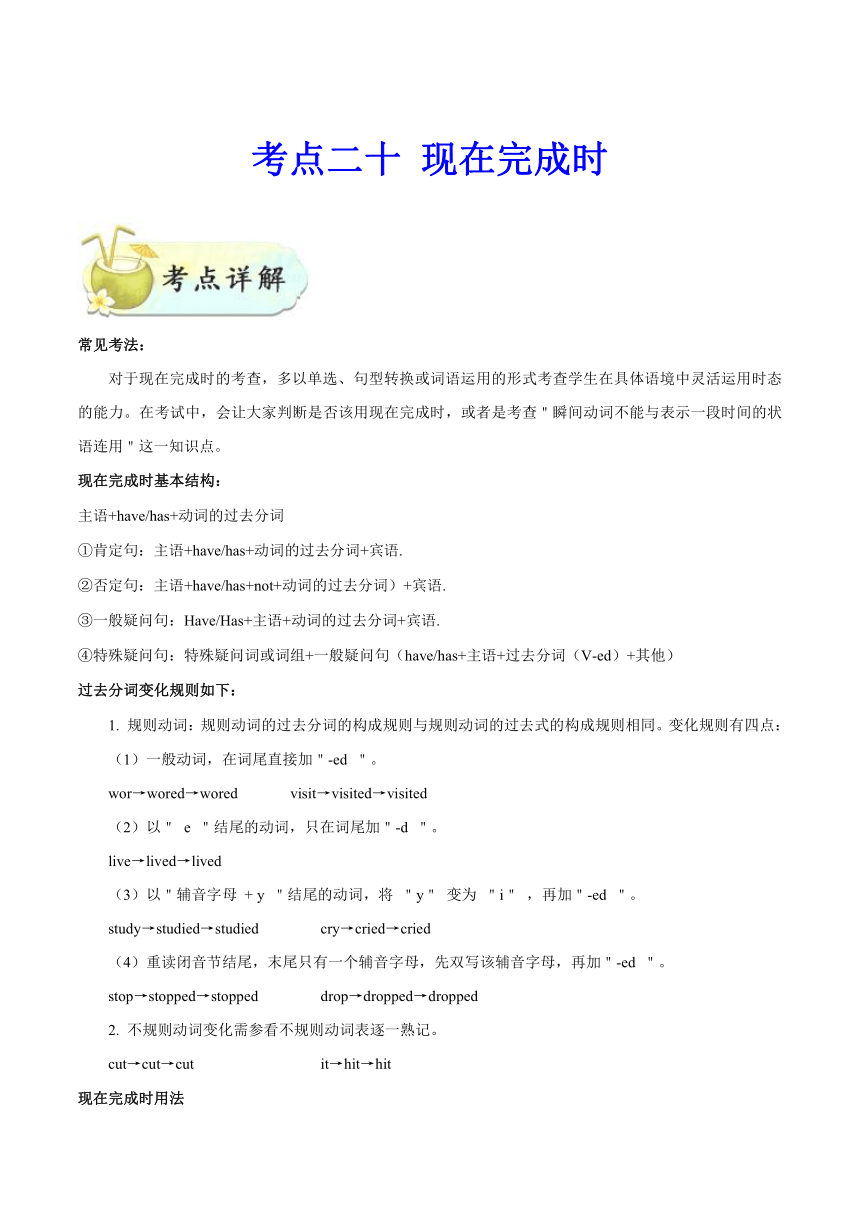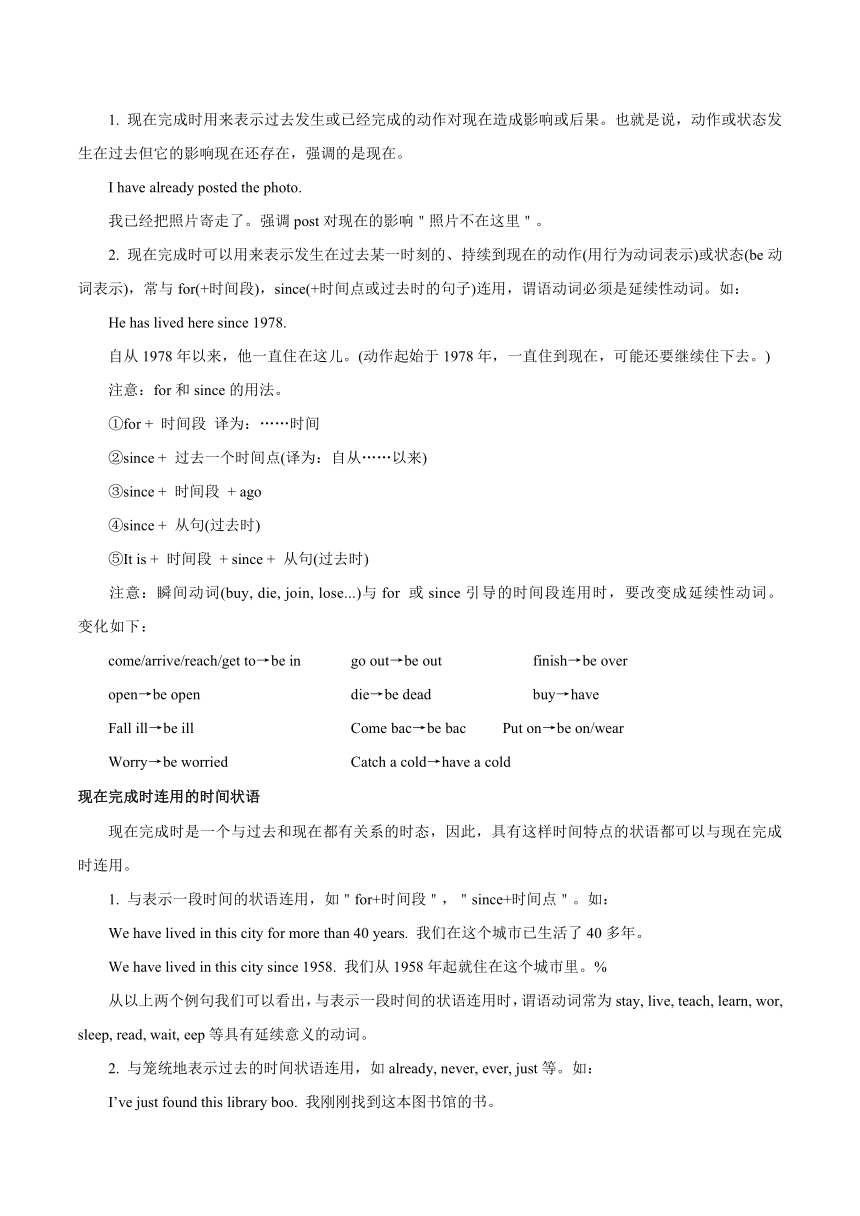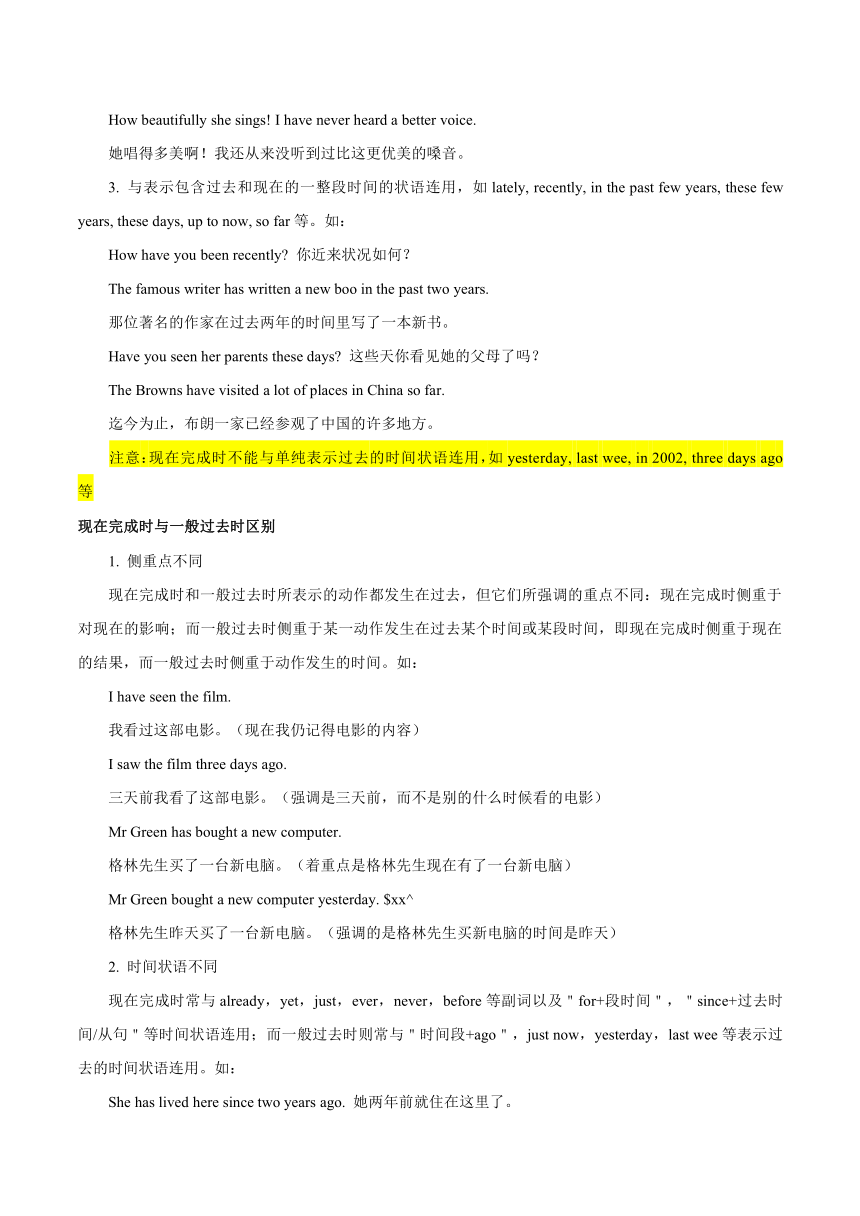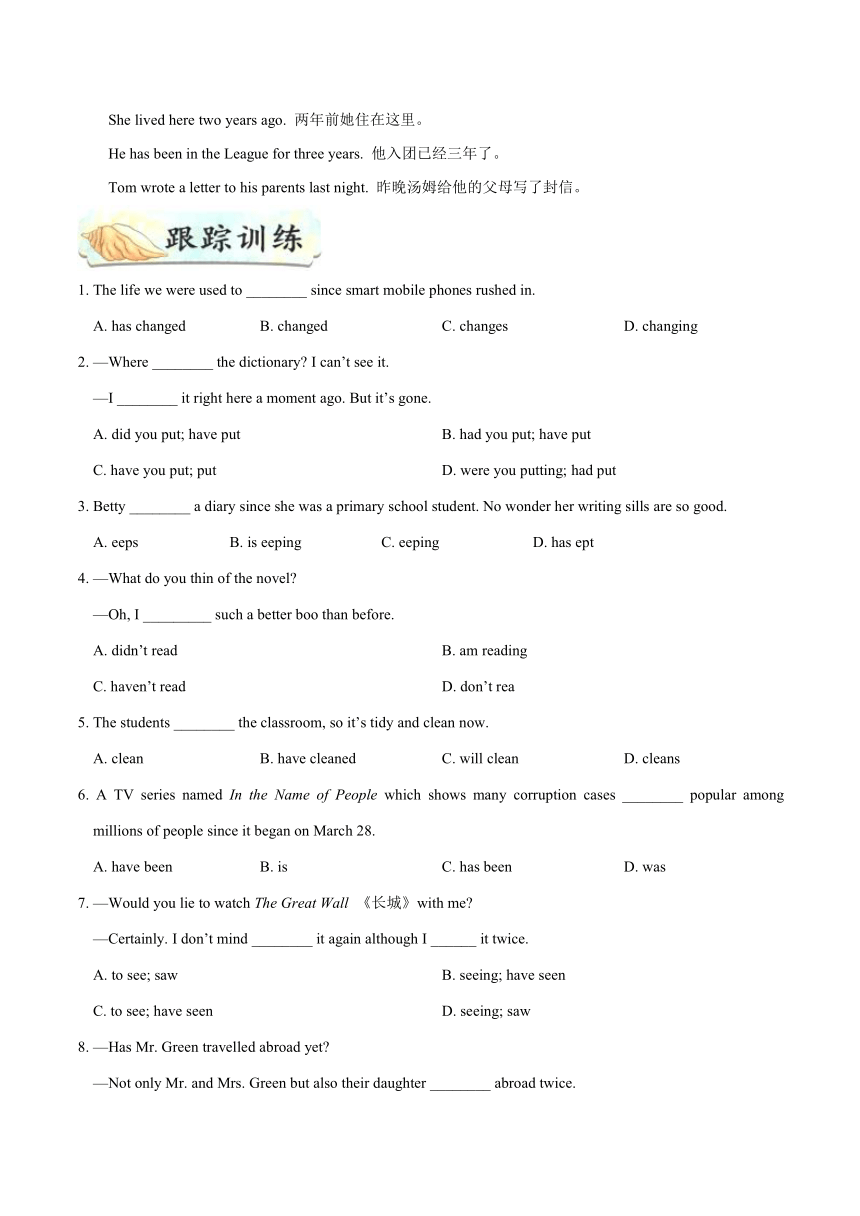考点20 现在完成时-备战2018年中考英语考点一遍过
文档属性
| 名称 | 考点20 现在完成时-备战2018年中考英语考点一遍过 |  | |
| 格式 | zip | ||
| 文件大小 | 336.4KB | ||
| 资源类型 | 教案 | ||
| 版本资源 | 通用版 | ||
| 科目 | 英语 | ||
| 更新时间 | 2018-01-03 16:24:44 | ||
图片预览




文档简介
考点二十 现在完成时
常见考法:
对于现在完成时的考查,多以单选、句型转换或词语运用的形式考查学生在具体语境中灵活运用时态的能力。在考试中,会让大家判断是否该用现在完成时,或者是考查"瞬间动词不能与表示一段时间的状语连用"这一知识点。
现在完成时基本结构:
主语+have/has+动词的过去分词
①肯定句:主语+have/has+动词的过去分词+宾语.
②否定句:主语+have/has+not+动词的过去分词)+宾语.
③一般疑问句:Have/Has+主语+动词的过去分词+宾语.
④特殊疑问句:特殊疑问词或词组+一般疑问句(have/has+主语+过去分词(V-ed)+其他)
过去分词变化规则如下:
1. 规则动词:规则动词的过去分词的构成规则与规则动词的过去式的构成规则相同。变化规则有四点:
(1)一般动词,在词尾直接加"-ed "。
wor→wored→wored visit→visited→visited
(2)以" e "结尾的动词,只在词尾加"-d "。
live→lived→lived
(3)以"辅音字母 + y "结尾的动词,将 "y" 变为 "i" ,再加"-ed "。
study→studied→studied cry→cried→cried
(4)重读闭音节结尾,末尾只有一个辅音字母,先双写该辅音字母,再加"-ed "。
stop→stopped→stopped drop→dropped→dropped
2. 不规则动词变化需参看不规则动词表逐一熟记。
cut→cut→cut it→hit→hit
现在完成时用法
1. 现在完成时用来表示过去发生或已经完成的动作对现在造成影响或后果。也就是说,动作或状态发生在过去但它的影响现在还存在,强调的是现在。
I have already posted the photo.
我已经把照片寄走了。强调post对现在的影响"照片不在这里"。
2. 现在完成时可以用来表示发生在过去某一时刻的、持续到现在的动作(用行为动词表示)或状态(be动词表示),常与for(+时间段),since(+时间点或过去时的句子)连用,谓语动词必须是延续性动词。如:
He has lived here since 1978.
自从1978年以来,他一直住在这儿。(动作起始于1978年,一直住到现在,可能还要继续住下去。)
注意:for和since的用法。
①for + 时间段 译为:……时间
②since + 过去一个时间点(译为:自从……以来)
③since + 时间段 + ago
④since + 从句(过去时)
⑤It is + 时间段 + since + 从句(过去时)
注意:瞬间动词(buy, die, join, lose...)与for 或since引导的时间段连用时,要改变成延续性动词。变化如下:
come/arrive/reach/get to→be in go out→be out finish→be over
open→be open die→be dead buy→have
Fall ill→be ill Come bac→be bac Put on→be on/wear
Worry→be worried Catch a cold→have a cold
现在完成时连用的时间状语
现在完成时是一个与过去和现在都有关系的时态,因此,具有这样时间特点的状语都可以与现在完成时连用。
1. 与表示一段时间的状语连用,如"for+时间段","since+时间点"。如:
We have lived in this city for more than 40 years. 我们在这个城市已生活了40多年。
We have lived in this city since 1958. 我们从1958年起就住在这个城市里。%
从以上两个例句我们可以看出,与表示一段时间的状语连用时,谓语动词常为stay, live, teach, learn, wor, sleep, read, wait, eep等具有延续意义的动词。
2. 与笼统地表示过去的时间状语连用,如already, never, ever, just等。如:
I’ve just found this library boo. 我刚刚找到这本图书馆的书。
How beautifully she sings! I have never heard a better voice.
她唱得多美啊!我还从来没听到过比这更优美的嗓音。
3. 与表示包含过去和现在的一整段时间的状语连用,如lately, recently, in the past few years, these few years, these days, up to now, so far等。如:
How have you been recently? 你近来状况如何?
The famous writer has written a new boo in the past two years.
那位著名的作家在过去两年的时间里写了一本新书。
Have you seen her parents these days? 这些天你看见她的父母了吗?
The Browns have visited a lot of places in China so far.
迄今为止,布朗一家已经参观了中国的许多地方。
注意:现在完成时不能与单纯表示过去的时间状语连用,如yesterday, last wee, in 2002, three days ago等
现在完成时与一般过去时区别
1. 侧重点不同
现在完成时和一般过去时所表示的动作都发生在过去,但它们所强调的重点不同:现在完成时侧重于对现在的影响;而一般过去时侧重于某一动作发生在过去某个时间或某段时间,即现在完成时侧重于现在的结果,而一般过去时侧重于动作发生的时间。如:
I have seen the film.
我看过这部电影。(现在我仍记得电影的内容)
I saw the film three days ago.
三天前我看了这部电影。(强调是三天前,而不是别的什么时候看的电影)
Mr Green has bought a new computer.
格林先生买了一台新电脑。(着重点是格林先生现在有了一台新电脑)
Mr Green bought a new computer yesterday. $xx^
格林先生昨天买了一台新电脑。(强调的是格林先生买新电脑的时间是昨天)
2. 时间状语不同
现在完成时常与already,yet,just,ever,never,before等副词以及"for+段时间","since+过去时间/从句"等时间状语连用;而一般过去时则常与"时间段+ago",just now,yesterday,last wee等表示过去的时间状语连用。如:
She has lived here since two years ago. 她两年前就住在这里了。
She lived here two years ago. 两年前她住在这里。
He has been in the League for three years. 他入团已经三年了。
Tom wrote a letter to his parents last night. 昨晚汤姆给他的父母写了封信。
1. The life we were used to ________ since smart mobile phones rushed in.
A. has changed B. changed C. changes D. changing
2. —Where ________ the dictionary? I can’t see it.
—I ________ it right here a moment ago. But it’s gone.
A. did you put; have put B. had you put; have put
C. have you put; put D. were you putting; had put
3. Betty ________ a diary since she was a primary school student. No wonder her writing sills are so good.
A. eeps B. is eeping C. eeping D. has ept
4. —What do you thin of the novel?
—Oh, I _________ such a better boo than before.
A. didn’t read B. am reading
C. haven’t read D. don’t rea
5. The students ________ the classroom, so it’s tidy and clean now.
A. clean B. have cleaned C. will clean D. cleans
6. A TV series named In the Name of People which shows many corruption cases ________ popular among millions of people since it began on March 28.
A. have been B. is C. has been D. was
7. —Would you lie to watch The Great Wall 《长城》with me?
—Certainly. I don’t mind ________ it again although I ______ it twice.
A. to see; saw B. seeing; have seen
C. to see; have seen D. seeing; saw
8. —Has Mr. Green travelled abroad yet?
—Not only Mr. and Mrs. Green but also their daughter ________ abroad twice.
A. have gone B. have been
C. has gone D. has been
1.(2017﹒四川南充)—Loo! Your teacher Miss White is over there.
—No, it can’t be her. She ________ to Beijing.
A. has gone B. has been C. went D. will go
2.(2017﹒安徽)I am surprised at the new loo of my hometown, for it ________ a lot over the years.
A. changed B. changes C. will change D. has changed
3.(2016﹒北京)It’s nice to see you again. We ________ each other since 2014.
A. won’t see B. don’t see C. haven’t seen D. didn’t see
4.(2016﹒福建厦门)—It’s the second time I came to Xiamen. It ________ a lot.
—Yes, it’s more and more beautiful.
A. was changing B. has changed C. will change
5.(2016﹒贵州黔西南)Nancy ________ for five years.
A. was dying B. has died C. died D. has been dead
6.(2016﹒海南)Uncle Liang ________ in Haiou since 1980, so he nows a lot about the city.
A. is living B. has lived C. lived
7.(2016﹒湖北黄冈)—How do you lie Treasure Island, Lucy?
—It’s so exciting that I _______ it twice.
A. am reading B. have read C. was reading D. had read
1. (江西省赣州市信丰县2017年普通高中提前招生考试)—Jenny, you are so beautiful in your new dress!
—Thans! But I __________ it for several times.
A. wear B. will wear C. was wearing D. have worn
2. (浙江省温州市龙湾区永中中学2017届九年级月考)—Peter says Red Roc Canyon is a great place for roc climbing.
—He’s right. I __________ there twice.
A. was going B. went C. have been D. have gone
3. (江苏省扬州市江都区宜陵镇中学2017届九年级期中)—Sorry, I’m late. _______ did the meeting begin?
—It doesn’t matter. The meeting _______ for several minutes.
A. When; has just begun B. When; has just been on
C. How long; has just been on D. How long; has just begun
4. (江苏省徐州市部分学校2017届九年级二模联考)—Loo! That man loos lie Mr. Green.
—It ______ be him, for he ______ America for a month.
A. can’t; has gone to B. may not; has gone to
C. mustn’t; has been in D. can’t; has been in
5. (浙江省永嘉县2017年5月初中毕业升学考试第二次适应性测试)—The weather report says that it will be sunny tomorrow.
—It’s wonderful. It _________ for a wee already, we need the sun.
A. rains B. will rain C. has rained D. was raining
6. (新疆乌鲁木齐市第九十八中学2017届中考四模)—Loo! Someone __________ the classroom.
—Well, it wasn’t me, I didn’t do it.
A. is cleaning B. was cleaning
C. has cleaned D. will clean
7. (上海市黄浦区2017届九年级二模)More than six million guests ________ Shanghai Disneyland Par since last June.
A. visit B. visited C. were visiting D. have visited
8. (徐州市2017年初中毕业、升学考试模拟)—Has your cousin arrived in Beijing yet?
—Yes. She ________ Beijing since yesterday morning.
A. arrived in B. has arrived in
C. has been in D. has been to
跟踪训练
2. C 【解析】句意:——你把字典放哪里了?我找不到了。——我刚才放在这里了,但是现在不见了。根据I can’t see it.可知,put发生在过去,强调对现在造成的影响,现在找不到了,故第一空用现在完成时。根据a moment ago可知,句子应该一般过去时。故选C。
3. D 【解析】句意:Betty自从小学的时候开始就记日记,难怪她的写作技能那么好。后面的从句是以since引导的从句,与它连用的主句一般用现在完成时。故选D。
4. C 【解析】句意:——你觉得这部小说怎么样?——哦,我以前从来没有读过比它更好的一本书。didn’t read没有读过,是一般过去时的否定形式;am reading现在进行时态;haven’t read现在完成时的否定形式;don’t read一般现在时的否定形式。根据句意可知,这里表示过去发生的动作对现在的影响,应使用现在完成时态,故选C。
5. B 【解析】句意:学生们已经打扫了教室,因此教室现在又干净又整洁。根据语境可知用现在完成时,其结构是have/has done的形式。主语是复数,这里用助动词have。故选B。
6. C 【解析】句意:反映一些腐败案件的电视剧《人民的名义》自从3月28日开播以来,受到人们的广泛欢迎。根据后半句since + 时间点可知要用现在完成时,排除B和D;又因为主语为a TV series,故选C。
7. B 【解析】句意:——你愿意跟我去看《长城》吗?——当然了,尽管我已经看了两遍,但我不介意再去看一遍。mind doing sth.介意做某人,结合句意,首先排除A、C;根据"I don’t mind ________ it again"和"although"可知尽管我已经看了两遍,但我不介意再去看一遍.所以看过两遍用现在完成时,答案选B。
8. D 【解析】句意:——格林先生已经出国旅行了吗?——不仅格林先生和格林夫人,而且他们的女儿已经出国两次了。短语have gone to...表示去了……,可能在途中,也可能已经到了;have been to...表示去过某地,现在已不在那里。not only...but also...表示不仅……而且……,连接两个主语时采用就近原则,这里要与their daughter保持一致,因此用has。故选D。
真题再现
1. A 【解析】考查现在完成时的用法。句意:——看!你的老师怀特小姐在那边。——不,那肯定不是她。她去了北京。A. has gone去了某地,表示该人不在说话地点;B. has been去过某地,表示主语曾经去过某地,有这种经历;C. went过去式,去;D. will go将来时态,将要去。根据前面的否定猜测,可知怀特小姐去了北京,故选A。
4. B 【解析】考查现在完成时的用法。句意:——这是我第二次来厦门。它已经变了很多。——是的,它越来越漂亮了。根据Yes, it’s more and more beautiful.可知此处描述厦门现在的情况,要用现在完成时,故选B。
5. D 【解析】考查现在完成时的用法。句意:南希已经去世五年了。A. was dying过去进行时态;B. has died现在完成时态;C. died一般过去时态;D. has been dead现在完成时态。句子强调的是过去开始的动作或状态一直延续到现在,句子用现在完成时态;die是一个非延续性动词,不能与表示一段时间的状语for...连用,换成成be dead。故选D。~
6. B 【解析】考查现在完成时的用法。句意:梁叔叔自从1980年以来一直住在海口,因此他对于这个城市非常了解。since自从。前面的句子用现在完成时,故选B。
7. B 【解析】考查现在完成时的用法。句意:——露西,你认为《金银岛》怎么样?——它是如此令人激动以至于我读了两次。根据twice可知已经发生了,故此处用现在完成时,故为have read,故选B。
模拟检测
1. D 【解析】句意:——珍尼,你穿着新裙子真漂亮。——谢谢!但是我穿了几次了。A. wear一般现在时态形式;B. will wear一般将来时态形式;C. was wearing过去进行时态形式;D. have worn现在完成时态形式。由for several times可知,句子描述的是过去发生的动作对现在造成影响或结果,句子用现在完成时态。故选D。
4. D 【解析】句意:——看,那个男士看起来像格林先生。——不可能是他,因为他去美国一个月了。can’t不可能,语气比较强;may not也许不;mustn’t禁止;根据for he ______ America for a month.可知,第一空应该用can’t;第二空所在的句子有时间段,所以谓语动词应该用延续性动词;has gone to不能与时间段连用。故选D。
5. C 【解析】句意:——天气预报说明天是晴天。——太棒了,已经下了一周的雨了,我们需要太阳。根据空后的时间状语for a wee already可知要用现在完成时。
6. C 【解析】句意:——看!有人已经打扫了教室。——噢,不是我,我没有做这件事。根据it wasn’t me, I didn’t do it.可知打扫教室这件事已经发生,根据Loo!可知表示现在看到的结果,应是到现在为止已经发生了,并对现在造成影响,故用现在完成时。故选C。21世纪教育
7. D 【解析】句意:自去年六月以来,已有六百万多名游客参观了上海迪士尼乐园。Since+表示过去的时间点从句或短语,意思是"自从……以来",该句子应使用现在完成时态。结合句意和语境可知选D。
8. C 【解析】句意:——你表妹到北京了吗?——是的。她从昨天早上起就在北京了。since yesterday morning自昨天早晨以来,表示的是截止到目前为止的时间段,用于现在完成时态,排除A;arrived为短暂性动词,不能与表示一段的时间状语连用;have been to表示某人去过某地,也不能与表示一段的时间状语连用,故答案为C。
常见考法:
对于现在完成时的考查,多以单选、句型转换或词语运用的形式考查学生在具体语境中灵活运用时态的能力。在考试中,会让大家判断是否该用现在完成时,或者是考查"瞬间动词不能与表示一段时间的状语连用"这一知识点。
现在完成时基本结构:
主语+have/has+动词的过去分词
①肯定句:主语+have/has+动词的过去分词+宾语.
②否定句:主语+have/has+not+动词的过去分词)+宾语.
③一般疑问句:Have/Has+主语+动词的过去分词+宾语.
④特殊疑问句:特殊疑问词或词组+一般疑问句(have/has+主语+过去分词(V-ed)+其他)
过去分词变化规则如下:
1. 规则动词:规则动词的过去分词的构成规则与规则动词的过去式的构成规则相同。变化规则有四点:
(1)一般动词,在词尾直接加"-ed "。
wor→wored→wored visit→visited→visited
(2)以" e "结尾的动词,只在词尾加"-d "。
live→lived→lived
(3)以"辅音字母 + y "结尾的动词,将 "y" 变为 "i" ,再加"-ed "。
study→studied→studied cry→cried→cried
(4)重读闭音节结尾,末尾只有一个辅音字母,先双写该辅音字母,再加"-ed "。
stop→stopped→stopped drop→dropped→dropped
2. 不规则动词变化需参看不规则动词表逐一熟记。
cut→cut→cut it→hit→hit
现在完成时用法
1. 现在完成时用来表示过去发生或已经完成的动作对现在造成影响或后果。也就是说,动作或状态发生在过去但它的影响现在还存在,强调的是现在。
I have already posted the photo.
我已经把照片寄走了。强调post对现在的影响"照片不在这里"。
2. 现在完成时可以用来表示发生在过去某一时刻的、持续到现在的动作(用行为动词表示)或状态(be动词表示),常与for(+时间段),since(+时间点或过去时的句子)连用,谓语动词必须是延续性动词。如:
He has lived here since 1978.
自从1978年以来,他一直住在这儿。(动作起始于1978年,一直住到现在,可能还要继续住下去。)
注意:for和since的用法。
①for + 时间段 译为:……时间
②since + 过去一个时间点(译为:自从……以来)
③since + 时间段 + ago
④since + 从句(过去时)
⑤It is + 时间段 + since + 从句(过去时)
注意:瞬间动词(buy, die, join, lose...)与for 或since引导的时间段连用时,要改变成延续性动词。变化如下:
come/arrive/reach/get to→be in go out→be out finish→be over
open→be open die→be dead buy→have
Fall ill→be ill Come bac→be bac Put on→be on/wear
Worry→be worried Catch a cold→have a cold
现在完成时连用的时间状语
现在完成时是一个与过去和现在都有关系的时态,因此,具有这样时间特点的状语都可以与现在完成时连用。
1. 与表示一段时间的状语连用,如"for+时间段","since+时间点"。如:
We have lived in this city for more than 40 years. 我们在这个城市已生活了40多年。
We have lived in this city since 1958. 我们从1958年起就住在这个城市里。%
从以上两个例句我们可以看出,与表示一段时间的状语连用时,谓语动词常为stay, live, teach, learn, wor, sleep, read, wait, eep等具有延续意义的动词。
2. 与笼统地表示过去的时间状语连用,如already, never, ever, just等。如:
I’ve just found this library boo. 我刚刚找到这本图书馆的书。
How beautifully she sings! I have never heard a better voice.
她唱得多美啊!我还从来没听到过比这更优美的嗓音。
3. 与表示包含过去和现在的一整段时间的状语连用,如lately, recently, in the past few years, these few years, these days, up to now, so far等。如:
How have you been recently? 你近来状况如何?
The famous writer has written a new boo in the past two years.
那位著名的作家在过去两年的时间里写了一本新书。
Have you seen her parents these days? 这些天你看见她的父母了吗?
The Browns have visited a lot of places in China so far.
迄今为止,布朗一家已经参观了中国的许多地方。
注意:现在完成时不能与单纯表示过去的时间状语连用,如yesterday, last wee, in 2002, three days ago等
现在完成时与一般过去时区别
1. 侧重点不同
现在完成时和一般过去时所表示的动作都发生在过去,但它们所强调的重点不同:现在完成时侧重于对现在的影响;而一般过去时侧重于某一动作发生在过去某个时间或某段时间,即现在完成时侧重于现在的结果,而一般过去时侧重于动作发生的时间。如:
I have seen the film.
我看过这部电影。(现在我仍记得电影的内容)
I saw the film three days ago.
三天前我看了这部电影。(强调是三天前,而不是别的什么时候看的电影)
Mr Green has bought a new computer.
格林先生买了一台新电脑。(着重点是格林先生现在有了一台新电脑)
Mr Green bought a new computer yesterday. $xx^
格林先生昨天买了一台新电脑。(强调的是格林先生买新电脑的时间是昨天)
2. 时间状语不同
现在完成时常与already,yet,just,ever,never,before等副词以及"for+段时间","since+过去时间/从句"等时间状语连用;而一般过去时则常与"时间段+ago",just now,yesterday,last wee等表示过去的时间状语连用。如:
She has lived here since two years ago. 她两年前就住在这里了。
She lived here two years ago. 两年前她住在这里。
He has been in the League for three years. 他入团已经三年了。
Tom wrote a letter to his parents last night. 昨晚汤姆给他的父母写了封信。
1. The life we were used to ________ since smart mobile phones rushed in.
A. has changed B. changed C. changes D. changing
2. —Where ________ the dictionary? I can’t see it.
—I ________ it right here a moment ago. But it’s gone.
A. did you put; have put B. had you put; have put
C. have you put; put D. were you putting; had put
3. Betty ________ a diary since she was a primary school student. No wonder her writing sills are so good.
A. eeps B. is eeping C. eeping D. has ept
4. —What do you thin of the novel?
—Oh, I _________ such a better boo than before.
A. didn’t read B. am reading
C. haven’t read D. don’t rea
5. The students ________ the classroom, so it’s tidy and clean now.
A. clean B. have cleaned C. will clean D. cleans
6. A TV series named In the Name of People which shows many corruption cases ________ popular among millions of people since it began on March 28.
A. have been B. is C. has been D. was
7. —Would you lie to watch The Great Wall 《长城》with me?
—Certainly. I don’t mind ________ it again although I ______ it twice.
A. to see; saw B. seeing; have seen
C. to see; have seen D. seeing; saw
8. —Has Mr. Green travelled abroad yet?
—Not only Mr. and Mrs. Green but also their daughter ________ abroad twice.
A. have gone B. have been
C. has gone D. has been
1.(2017﹒四川南充)—Loo! Your teacher Miss White is over there.
—No, it can’t be her. She ________ to Beijing.
A. has gone B. has been C. went D. will go
2.(2017﹒安徽)I am surprised at the new loo of my hometown, for it ________ a lot over the years.
A. changed B. changes C. will change D. has changed
3.(2016﹒北京)It’s nice to see you again. We ________ each other since 2014.
A. won’t see B. don’t see C. haven’t seen D. didn’t see
4.(2016﹒福建厦门)—It’s the second time I came to Xiamen. It ________ a lot.
—Yes, it’s more and more beautiful.
A. was changing B. has changed C. will change
5.(2016﹒贵州黔西南)Nancy ________ for five years.
A. was dying B. has died C. died D. has been dead
6.(2016﹒海南)Uncle Liang ________ in Haiou since 1980, so he nows a lot about the city.
A. is living B. has lived C. lived
7.(2016﹒湖北黄冈)—How do you lie Treasure Island, Lucy?
—It’s so exciting that I _______ it twice.
A. am reading B. have read C. was reading D. had read
1. (江西省赣州市信丰县2017年普通高中提前招生考试)—Jenny, you are so beautiful in your new dress!
—Thans! But I __________ it for several times.
A. wear B. will wear C. was wearing D. have worn
2. (浙江省温州市龙湾区永中中学2017届九年级月考)—Peter says Red Roc Canyon is a great place for roc climbing.
—He’s right. I __________ there twice.
A. was going B. went C. have been D. have gone
3. (江苏省扬州市江都区宜陵镇中学2017届九年级期中)—Sorry, I’m late. _______ did the meeting begin?
—It doesn’t matter. The meeting _______ for several minutes.
A. When; has just begun B. When; has just been on
C. How long; has just been on D. How long; has just begun
4. (江苏省徐州市部分学校2017届九年级二模联考)—Loo! That man loos lie Mr. Green.
—It ______ be him, for he ______ America for a month.
A. can’t; has gone to B. may not; has gone to
C. mustn’t; has been in D. can’t; has been in
5. (浙江省永嘉县2017年5月初中毕业升学考试第二次适应性测试)—The weather report says that it will be sunny tomorrow.
—It’s wonderful. It _________ for a wee already, we need the sun.
A. rains B. will rain C. has rained D. was raining
6. (新疆乌鲁木齐市第九十八中学2017届中考四模)—Loo! Someone __________ the classroom.
—Well, it wasn’t me, I didn’t do it.
A. is cleaning B. was cleaning
C. has cleaned D. will clean
7. (上海市黄浦区2017届九年级二模)More than six million guests ________ Shanghai Disneyland Par since last June.
A. visit B. visited C. were visiting D. have visited
8. (徐州市2017年初中毕业、升学考试模拟)—Has your cousin arrived in Beijing yet?
—Yes. She ________ Beijing since yesterday morning.
A. arrived in B. has arrived in
C. has been in D. has been to
跟踪训练
2. C 【解析】句意:——你把字典放哪里了?我找不到了。——我刚才放在这里了,但是现在不见了。根据I can’t see it.可知,put发生在过去,强调对现在造成的影响,现在找不到了,故第一空用现在完成时。根据a moment ago可知,句子应该一般过去时。故选C。
3. D 【解析】句意:Betty自从小学的时候开始就记日记,难怪她的写作技能那么好。后面的从句是以since引导的从句,与它连用的主句一般用现在完成时。故选D。
4. C 【解析】句意:——你觉得这部小说怎么样?——哦,我以前从来没有读过比它更好的一本书。didn’t read没有读过,是一般过去时的否定形式;am reading现在进行时态;haven’t read现在完成时的否定形式;don’t read一般现在时的否定形式。根据句意可知,这里表示过去发生的动作对现在的影响,应使用现在完成时态,故选C。
5. B 【解析】句意:学生们已经打扫了教室,因此教室现在又干净又整洁。根据语境可知用现在完成时,其结构是have/has done的形式。主语是复数,这里用助动词have。故选B。
6. C 【解析】句意:反映一些腐败案件的电视剧《人民的名义》自从3月28日开播以来,受到人们的广泛欢迎。根据后半句since + 时间点可知要用现在完成时,排除B和D;又因为主语为a TV series,故选C。
7. B 【解析】句意:——你愿意跟我去看《长城》吗?——当然了,尽管我已经看了两遍,但我不介意再去看一遍。mind doing sth.介意做某人,结合句意,首先排除A、C;根据"I don’t mind ________ it again"和"although"可知尽管我已经看了两遍,但我不介意再去看一遍.所以看过两遍用现在完成时,答案选B。
8. D 【解析】句意:——格林先生已经出国旅行了吗?——不仅格林先生和格林夫人,而且他们的女儿已经出国两次了。短语have gone to...表示去了……,可能在途中,也可能已经到了;have been to...表示去过某地,现在已不在那里。not only...but also...表示不仅……而且……,连接两个主语时采用就近原则,这里要与their daughter保持一致,因此用has。故选D。
真题再现
1. A 【解析】考查现在完成时的用法。句意:——看!你的老师怀特小姐在那边。——不,那肯定不是她。她去了北京。A. has gone去了某地,表示该人不在说话地点;B. has been去过某地,表示主语曾经去过某地,有这种经历;C. went过去式,去;D. will go将来时态,将要去。根据前面的否定猜测,可知怀特小姐去了北京,故选A。
4. B 【解析】考查现在完成时的用法。句意:——这是我第二次来厦门。它已经变了很多。——是的,它越来越漂亮了。根据Yes, it’s more and more beautiful.可知此处描述厦门现在的情况,要用现在完成时,故选B。
5. D 【解析】考查现在完成时的用法。句意:南希已经去世五年了。A. was dying过去进行时态;B. has died现在完成时态;C. died一般过去时态;D. has been dead现在完成时态。句子强调的是过去开始的动作或状态一直延续到现在,句子用现在完成时态;die是一个非延续性动词,不能与表示一段时间的状语for...连用,换成成be dead。故选D。~
6. B 【解析】考查现在完成时的用法。句意:梁叔叔自从1980年以来一直住在海口,因此他对于这个城市非常了解。since自从。前面的句子用现在完成时,故选B。
7. B 【解析】考查现在完成时的用法。句意:——露西,你认为《金银岛》怎么样?——它是如此令人激动以至于我读了两次。根据twice可知已经发生了,故此处用现在完成时,故为have read,故选B。
模拟检测
1. D 【解析】句意:——珍尼,你穿着新裙子真漂亮。——谢谢!但是我穿了几次了。A. wear一般现在时态形式;B. will wear一般将来时态形式;C. was wearing过去进行时态形式;D. have worn现在完成时态形式。由for several times可知,句子描述的是过去发生的动作对现在造成影响或结果,句子用现在完成时态。故选D。
4. D 【解析】句意:——看,那个男士看起来像格林先生。——不可能是他,因为他去美国一个月了。can’t不可能,语气比较强;may not也许不;mustn’t禁止;根据for he ______ America for a month.可知,第一空应该用can’t;第二空所在的句子有时间段,所以谓语动词应该用延续性动词;has gone to不能与时间段连用。故选D。
5. C 【解析】句意:——天气预报说明天是晴天。——太棒了,已经下了一周的雨了,我们需要太阳。根据空后的时间状语for a wee already可知要用现在完成时。
6. C 【解析】句意:——看!有人已经打扫了教室。——噢,不是我,我没有做这件事。根据it wasn’t me, I didn’t do it.可知打扫教室这件事已经发生,根据Loo!可知表示现在看到的结果,应是到现在为止已经发生了,并对现在造成影响,故用现在完成时。故选C。21世纪教育
7. D 【解析】句意:自去年六月以来,已有六百万多名游客参观了上海迪士尼乐园。Since+表示过去的时间点从句或短语,意思是"自从……以来",该句子应使用现在完成时态。结合句意和语境可知选D。
8. C 【解析】句意:——你表妹到北京了吗?——是的。她从昨天早上起就在北京了。since yesterday morning自昨天早晨以来,表示的是截止到目前为止的时间段,用于现在完成时态,排除A;arrived为短暂性动词,不能与表示一段的时间状语连用;have been to表示某人去过某地,也不能与表示一段的时间状语连用,故答案为C。
同课章节目录
- 词法
- 名词
- 动词和动词短语
- 动词语态
- 动词时态
- 助动词和情态动词
- 非谓语动词
- 冠词
- 代词
- 数词和量词
- 形容词副词及其比较等级
- 介词和介词短语
- 连词和感叹词
- 构词法
- 相似、相近词比较
- 句法
- 陈述句
- 一般疑问句和否定疑问句
- 特殊疑问句及选择疑问句
- 反意疑问句
- 存在句(There be句型)
- 宾语从句
- 定语从句
- 状语从句
- 主谓一致问题
- 简单句
- 并列句
- 复合句
- 主谓一致
- 主、表语从句
- 名词性从句
- 直接引语和间接引语
- 虚拟语气
- 感叹句
- 强调句
- 倒装句
- 祈使句
- 句子的成分
- 句子的分类
- 题型专区
- 单项选择部分
- 易错题
- 完形填空
- 阅读理解
- 词汇练习
- 听说训练
- 句型转换
- 补全对话
- 短文改错
- 翻译
- 书面表达
- 任务型阅读
- 语法填空
- 其他资料
